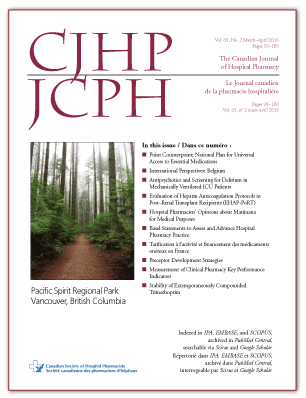Opinions of Hospital Pharmacists in Canada Regarding Marijuana for Medical Purposes
DOI:
https://doi.org/10.4212/cjhp.v69i2.1539Keywords:
medical marijuana, Marihuana for Medical Purposes Regulations, hospital pharmacists, safety, efficacy, knowledge, marihuana à des fins médicales, Règlement sur la marihuana à des fins médicales, pharmaciens d’hôpitaux, sécurité, efficacité, connaissanceAbstract
ABSTRACT
Background: Canada’s most recent Marihuana for Medical Purposes Regulations have changed the way in which patients access marijuana. Furthermore, if authorized by the person in charge of the hospital, a pharmacist practising in a hospital may now place orders with licensed producers for dried marijuana for in-hospital use by patients. As use of this product increases, hospital pharmacists may have an increased role in the care of patients who are using marijuana for medical purposes.
Objectives: The primary objective of this study was to determine the opinions of hospital pharmacists in Canada regarding marijuana for medical purposes. The secondary objective was to assess the factors influencing these opinions.
Methods: An online survey was made available in early 2015 to licensed hospital pharmacists in Canada through individual provincial and territorial pharmacy regulatory bodies, pharmacist associations, hospital pharmacy directors, the Canadian Society of Hospital Pharmacists, and the Association des pharmaciens des établissements de santé du Québec. Responses were based on a 5-point Likert style scale, ranging from “completely agree” to “completely disagree”.
Results: A total of 769 valid survey responses were received. Among the respondents, 44.6% (333/747) agreed that marijuana is safe, whereas 55.2% (411/745) agreed that it is effective. Only 17.2% (129/748) agreed that they were knowledgeable about marijuana for medical purposes, and about 65% of respondents reported no formal training in this area. Factors that influenced respondents’ opinions were age, education, area of clinical practice, province of work, and personal experience.
Conclusion: Many Canadian hospital pharmacists agreed that marijuana for medical purposes is safe and effective, yet few considered themselves knowledgeable about this substance, with more than half reporting no formal training on the topic.
RÉSUMÉ
Contexte : Le Règlement sur la marihuana à des fins médicales récemment mis en vigueur au Canada a changé la façon dont les patients ont accès à ce produit. En outre, s’il est autorisé à le faire par la personne à qui est confiée la charge de l’hôpital, le pharmacien qui exerce dans un hôpital peut maintenant commander auprès de producteurs autorisés de la marihuana séchée destinée à une personne qui reçoit un traitement comme patient hospitalisé. Au fur et à mesure qu’augmente l’utilisation de cet agent, les pharmaciens d’hôpitaux pourraient avoir un rôle plus important à jouer dans les soins aux patients qui consomment de la marihuana à des fins médicales.
Objectifs : L’objectif principal de la présente étude était de sonder l’opinion des pharmaciens d’hôpitaux du Canada sur la question de la marihuana à des fins médicales. Le second objectif était d’évaluer les facteurs qui influencent leur opinion.
Méthodes : Un sondage en ligne a été mis à la disposition des pharmaciens d’hôpitaux du Canada avec la participation des organismes provinciaux et territoriaux de réglementation de la pharmacie, des associations de pharmaciens, des directeurs de pharmacie hospitalière, de la Société canadienne des pharmaciens d’hôpitaux et de l’Association des pharmaciens des établissements de santé du Québec. Inspirés de l’échelle de Likert à cinq points, les choix de réponse s’étendaient de « fortement en accord » à « fortement en désaccord ».
Résultats : Au total, 769 réponses valides au sondage ont été obtenues. Parmi les répondants, 44,6 % (333/747) ont affirmé que la marihuana est sécuritaire et 55,2 % (411/745) ont déclaré qu’elle est efficace. Seuls17.2 % (129/748) ont affirmé être renseignés sur l’utilisation de la marihuana à des fins médicales et environ 65 % ont indiqué n’avoir aucune formation officielle sur le sujet. L’âge du pharmacien, sa formation, son domaine de pratique clinique, sa province d’exercice et son experience personnelle étaient des facteurs influençant son opinion.
Conclusion : Bon nombre de pharmaciens hospitaliers canadiens ont affirmé que l’utilisation de la marihuana à des fins médicales est sécuritaire et efficace. Or, peu considéraient être renseignés à propos de ce produit et plus de la moitié ont indiqué n’avoir aucune formation officielle sur le sujet.
Downloads
Published
Issue
Section
License
Copyright © Canadian Society of Healthcare-Systems Pharmacy.
After publication of a manuscript in the CJHP, the authors of the manuscript must obtain written permission from the CSHP (publications@cshp.ca) before reproducing any text, figures, tables, or illustrations from the work in future works of their own. If a submitted manuscript is declined for publication in the CJHP, all said rights shall revert to the authors. Please note that any forms (e.g., preprinted orders and patient intake forms) used by a specific hospital or other health care facility and included as illustrative material with a manuscript are exempt from this copyright transfer. The CJHP will require a letter from the hospital or health care facility granting permission to publish the document(s).










